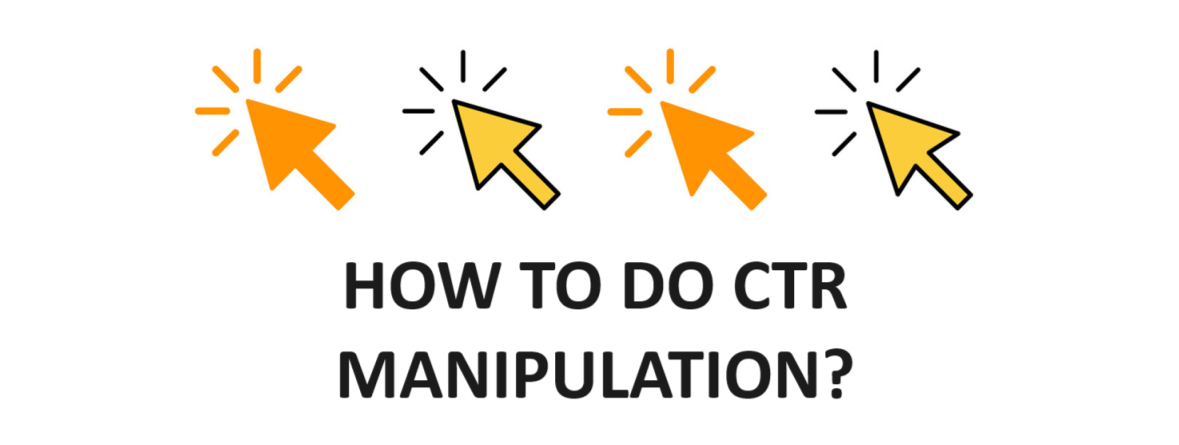CTR Manipulation Press Release: Revealing Ingenious Methods for Better Search Engine Optimization
Wiki Article
Checking Out the Relationship Between CTR Manipulation Services and Individual Actions
In the world of electronic advertising, the influence of click-through price (CTR) manipulation solutions on user actions stays a facility and interesting subject. By exploring the detailed connection between CTR control solutions and individual habits, appealing understandings arise that might improve our understanding of electronic advertising and marketing approaches and their results on customers.Effect of CTR Control on Habits
Examining the influence of Click-Through Price (CTR) adjustment on user habits reveals essential understandings into the characteristics of online involvement. CTR adjustment entails synthetically inflating the number of click a certain web link or advertisement to trick customers and internet search engine. This technique can cause a distorted assumption of a website's appeal or importance, ultimately impacting individual actions.
Additionally, CTR adjustment can skew the data utilized by algorithms to individualize user experiences. This can result in customers being served material that does not line up with their choices or rate of interests, inevitably leading to a decrease in customer contentment and interaction. Recognizing the effect of CTR adjustment on individual behavior is essential for preserving openness and rely on on the internet communications.
User Interaction With Manipulated CTR
Customer engagement with adjusted CTR data commonly causes manipulated perceptions of on-line web content popularity and importance. When individuals connect with web content based upon unnaturally filled with air Click-Through Fees (CTR), they might believe that particular information, products, or services are extra popular or trustworthy than they actually are. This can cause individuals choosing based on deceptive information, bring about possibly negative outcomes.Interaction metrics like sort, shares, remarks, and time invested in a web page are frequently affected by CTR control. Individuals might be a lot more inclined to involve with content that appears to have greater engagement rates, better continuing the cycle of manipulated perceptions. As an outcome, material creators and advertisers may focus on creating content that generates high CTR rather than focusing on developing really important and pertinent product.

Mental Impacts of CTR Control

In addition, the emotional effects of CTR control can additionally materialize in altered decision-making processes. Users might be extra inclined to click material solely based upon its perceived appeal, as opposed to its real value or significance to their demands. This behavior shift can cause a superficial involvement with online material, where individuals might forget top notch yet less preferred offerings for those with synthetically improved CTRs.
Fundamentally, the emotional implications of CTR adjustment highlight the relevance of maintaining openness and credibility in online interactions to foster authentic individual engagement and count on.
Ethical Considerations in CTR Control
Considering the moral implications of manipulating click-through rates (CTR) in on-line systems is essential for keeping integrity and trust within the digital ecosystem. CTR control elevates issues about tricking individuals, distorting click this data analytics, and jeopardizing the integrity of online content. One major honest factor to consider is the possible effect on individual autonomy and decision-making. By synthetically inflating CTR, individuals may be misled into clicking web links or advertisements they would not have picked otherwise, bring about a disingenuous online experience. CTR adjustment can alter the efficiency metrics that businesses count on to make tactical choices, eventually influencing market competition and consumer count on.An additional moral facet to ponder is the justness of controling CTR to gain an unfair benefit over rivals. Involving in such practices not just breaches principles of reasonable play but additionally weakens the trust fund that customers put in on the internet platforms. It is essential for organizations and digital marketing experts to promote ethical requirements in their practices to guarantee openness, reliability, and long-lasting sustainability in the on the internet atmosphere.
Ramifications for Digital Advertising And Marketing
With the boosting dependence on digital platforms for advertising functions, the technique of adjusting click-through prices (CTR) poses significant effects for the efficiency and honesty of electronic marketing techniques. CTR adjustment can cause manipulated data analytics, misinforming marketing experts right into thinking that their projects are carrying out better than they really are. This can result in misallocation of resources, with firms investing in underperforming strategies based on falsified CTRs. When individuals realize that CTRs have actually been controlled, it can deteriorate trust in the brand, leading to long-lasting adverse consequences for consumer loyalty and brand name credibility.Additionally, the usage of CTR control solutions can create an unfair competitive landscape, where companies that engage in such techniques get a fabricated benefit over those that comply with ethical marketing standards. This can stifle advancement and imagination in electronic advertising and marketing, as success comes to be even more concerning adjustment methods than delivering real value to consumers. Inevitably, the implications of CTR manipulation for electronic advertising and marketing expand past temporary gains, influencing the total sustainability and trustworthiness of advertising efforts in the electronic realm.
Final Thought
To conclude, the connection between CTR More about the author adjustment solutions and user habits is intricate and multifaceted. The effect of CTR control on behavior, user engagement with adjusted CTR, psychological effects, ethical factors to consider, and implications for digital advertising and marketing all play a duty fit this partnership. Recognizing these characteristics is vital review for marketing experts and researchers alike in order to browse the moral ramifications and optimize the effectiveness of their digital marketing methods.Report this wiki page